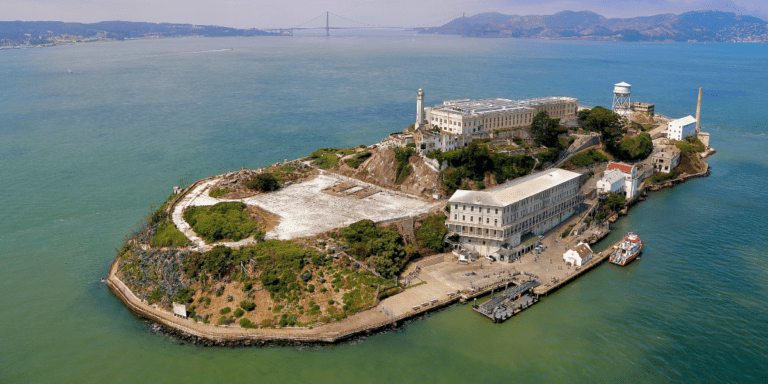In a significant and highly controversial move, President Donald Trump announced plans to reopen Alcatraz Island as a high-security detention facility. This decision, part of a broader strategy targeting violent crime, has reignited debates surrounding criminal justice reform, human rights, and the role of prisons in modern society. Alcatraz, known for its dark legacy as a notorious federal prison, is being reconsidered for its past function in a symbolic return to tough-on-crime policies.
A Bold Yet Divisive Political Statement
Alcatraz’s closure in 1963 marked the end of its infamy as a maximum-security prison, housing some of America’s most notorious criminals. Since then, it has become a popular tourist destination and a national park, symbolizing the nation’s effort to move beyond its harshest penal practices. However, under the Trump administration, the island’s reopening as a detention center is positioned as a forceful response to rising crime rates and a growing sense of public insecurity.
Supporters of the proposal view the revival of Alcatraz as a necessary measure to house the most dangerous offenders, with the President’s statement describing it as a facility designed for “America’s most violent criminals.” For many within Trump’s political base, this echoes a promise of law and order—a return to stricter penal policies in response to what they perceive as a lack of sufficient deterrence against violent crime.
However, critics argue that the idea is less about pragmatic criminal justice reform and more about political theater. Legal experts and criminal reform advocates have expressed skepticism, with some suggesting that this proposal serves as a convenient way to stoke fear and support for regressive law enforcement tactics, rather than offering a meaningful solution to crime. They view Alcatraz as a symbol of outdated punitive measures, a relic of an era that prioritized retribution over rehabilitation and restorative justice.
Concerns Over Human Rights and Ethical Implications
The proposal has quickly garnered backlash from human rights organizations, including the ACLU and Human Rights Watch, which have raised concerns about the potential for inhumane conditions. These groups argue that the island’s remote location, historical isolation, and harsh environment would make it incompatible with modern standards of humane incarceration. With a growing emphasis on rehabilitative approaches in the justice system, critics contend that reviving Alcatraz could undermine the progress made in reforming America’s prison system.
Legal challenges could also arise, given the island’s status as a historical landmark and national park. There are significant concerns regarding the potential destruction of the island’s infrastructure, as well as the environmental and preservationist restrictions that could impede the construction and operation of a detention facility. The costs and logistical difficulties associated with restoring the facility to prison standards would be immense, especially given the island’s limited access and resources.
Political and Social Repercussions
This proposal is part of a broader trend within the Trump administration’s policies, which have increasingly emphasized a “tough-on-crime” stance. From expanding mandatory minimum sentencing to strengthening federal law enforcement powers, these initiatives have drawn criticism from those who argue that such policies contribute to mass incarceration and racial inequality in the justice system.
The reopening of Alcatraz, many argue, would serve as a stark reminder of the nation’s troubled history with incarceration. By embracing a system that is rooted in isolation and punishment, rather than rehabilitation and restorative justice, the move risks perpetuating a punitive approach that has failed to address the root causes of crime. The shift represents a divergence from contemporary criminal justice reform efforts that focus on reducing incarceration rates and providing alternatives to traditional detention.
The future of Alcatraz as a high-security detention center remains uncertain, as the proposal faces scrutiny in Congress and is likely to face significant legal challenges. Regardless of the outcome, the announcement has reignited a long-standing debate over America’s penal philosophy and the role of prisons in a just society. As the discussions continue, the shadow of Alcatraz once again looms over the national conscience, reminding us of the ongoing tension between punishment and reform in the American justice system.


